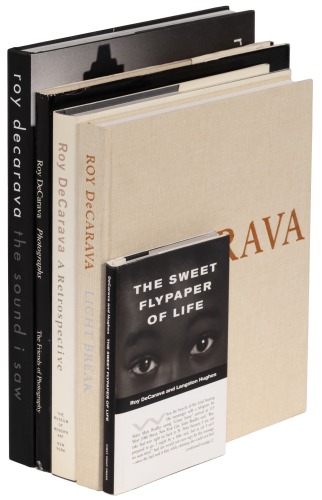Roy DeCarava Twelve Photogravures Ashuelot: Renaissance Press, 1991. Twelve photogravures. Each approximately 8 x 11 in. (20.3 x 27.9 cm) or the reverse Each signed, dated and numbered 48/50 in pencil in the margin. Colophon. Title page. Enclosed in a linen clamshell portfolio case.
Provenance Acquired directly from the artist Catalogue Essay Titles include: Paul Robeson, New York, 1950; Lingerie, New York, 1950; Horace Silver, New York, 1963; Couple dancing, New York, 1956; Across the street, night, Brooklyn, 1978; Night feeding, Brooklyn, 1973; Billie at Braddocks, New York, 1952; Man in window, Brooklyn, 1978; Fourth of July, Prospect Park, Brooklyn, 1979; Dancers, New York, 1956; Four men, New York, 1956 Following his training as a painter at The Cooper Union and the Harlem Arts Center, Roy DeCarava turned to the camera. “It was the directness of the medium that attracted me,” he later explained his switch from the paintbrush to the camera lens. “Through the camera I was able to make contact with the world and express my feelings about it more directly.” Employing his painterly eye and affinity for graphic design, DeCarava was not concerned with capturing the likeness of his subjects but their spirit and humane touch. His printing decisions, likewise, did not merely revolve around clarity but atmosphere. As such, DeCarava’s images are not meant to be interpreted as mere visual recorders of the African American demographic they capture so poetically but rather as emotionally charged and likewise evocative of the space and time in which they were first taken. As an oeuvre, DeCarava’s works provide a richly illuminating and expressive narrative of an era and time that may have otherwise gone amiss. DeCarava’s career in photography enjoyed longevity and recognition from an early stage. In 1951, at the age of 32, he became the ninth photographer and the first African American to win a Guggenheim Fellowship. In 1955 his first book was published, one of 5 he would come to produce throughout his career. In 2001 DeCarava was the recipient of the Gold Medal in Photography from the National Arts Club and five years later he was awarded the National Medal of Arts from the National Endowment for the Arts. Read More
Roy DeCarava Twelve Photogravures Ashuelot: Renaissance Press, 1991. Twelve photogravures. Each approximately 8 x 11 in. (20.3 x 27.9 cm) or the reverse Each signed, dated and numbered 48/50 in pencil in the margin. Colophon. Title page. Enclosed in a linen clamshell portfolio case.
Provenance Acquired directly from the artist Catalogue Essay Titles include: Paul Robeson, New York, 1950; Lingerie, New York, 1950; Horace Silver, New York, 1963; Couple dancing, New York, 1956; Across the street, night, Brooklyn, 1978; Night feeding, Brooklyn, 1973; Billie at Braddocks, New York, 1952; Man in window, Brooklyn, 1978; Fourth of July, Prospect Park, Brooklyn, 1979; Dancers, New York, 1956; Four men, New York, 1956 Following his training as a painter at The Cooper Union and the Harlem Arts Center, Roy DeCarava turned to the camera. “It was the directness of the medium that attracted me,” he later explained his switch from the paintbrush to the camera lens. “Through the camera I was able to make contact with the world and express my feelings about it more directly.” Employing his painterly eye and affinity for graphic design, DeCarava was not concerned with capturing the likeness of his subjects but their spirit and humane touch. His printing decisions, likewise, did not merely revolve around clarity but atmosphere. As such, DeCarava’s images are not meant to be interpreted as mere visual recorders of the African American demographic they capture so poetically but rather as emotionally charged and likewise evocative of the space and time in which they were first taken. As an oeuvre, DeCarava’s works provide a richly illuminating and expressive narrative of an era and time that may have otherwise gone amiss. DeCarava’s career in photography enjoyed longevity and recognition from an early stage. In 1951, at the age of 32, he became the ninth photographer and the first African American to win a Guggenheim Fellowship. In 1955 his first book was published, one of 5 he would come to produce throughout his career. In 2001 DeCarava was the recipient of the Gold Medal in Photography from the National Arts Club and five years later he was awarded the National Medal of Arts from the National Endowment for the Arts. Read More














Testen Sie LotSearch und seine Premium-Features 7 Tage - ohne Kosten!
Lassen Sie sich automatisch über neue Objekte in kommenden Auktionen benachrichtigen.
Suchauftrag anlegen